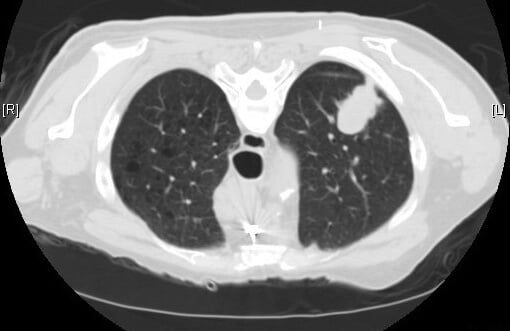Smokers who get an inside look at their lungs through a CT scan are more likely to quit than those who don’t get a screening.
The higher rate of kicking the habit occurs in the short term and also endures for several years, according to researchers from the University of Liverpool and their colleagues.

Lung cancer has the highest mortality rate by far among all types of cancer, but the new study suggests that exposing people to a CT screening of their lungs may have a significant impact on smoking rates.
The study, involving more than 4,000 individuals, found that those who received a CT scan of their lungs had a 10 percent cessation rate after two weeks, compared to just 5 percent of those who did not receive a CT screening over the same period of time.
After two years, 15 percent of those in the CT group had kicked the habit, compared to 10 percent of individuals in the non-CT group.
“Lung cancer continues to be the leading cause of cancer mortality worldwide,” said John Field, University of Liverpool’s Clinical Professor of Molecular Oncology and Chief Investigator of the UK Lung Cancer Screening Trial.
A key result of the study is that it overturns some thinking that a negative test would not encourage individuals to quit, said Field.
Related: Standardized Cigarette Packaging Could Help Put an End to Smoking
“The findings of this study dispute the belief that a negative screening result offers a ‘license to smoke.’ Engaging with lung screening can give smokers an opportunity to access smoking cessation support – at a time when they are likely to be more receptive to offers of help,” Field added.
“Our trial shows that CT lung cancer screening offers a teachable moment for smoking cessation among high-risk groups in the UK,” said Dr. Kate Brain of Cardiff University. It stands to reason that the results apply in other countries, including the U.S.
“We now need evidence about the best ways of integrating lung cancer screening with stop-smoking support, so that services are designed to deliver the maximum health benefits for current and future generations,” said Brain.
No Fear
The Liverpool researchers also discovered another interesting finding – people who receive a CT scan aren’t necessarily stressed out by the situation.
“Sometimes, fear of medical procedures and the results they might bring can prevent people from seeking life-saving tests,” said Brain. “However, what our trial shows is that CT lung cancer screening actually has no long-term negative psychosocial impact on patients, making it an excellent tool for catching lung cancer earlier when there is a better chance of survival.”

The positive impact on smoking cessation and the lack of a stress-inducing encounter may make CT scans more prevalent among current and former smokers.
“This further research into the psychosocial impact of screenings will further contribute to clinical and policy decisions regarding the successful implementation of potential future low-dose CT lung screening for high-risk individuals,” added Field.
About 222,000 cases of lung cancer are expected to emerge in the U.S. in 2017, according to estimates from the American Cancer Society. As a whole, lung cancer kills more people than breast, colon and prostate cancers combined.
Richard Scott is a health care reporter focusing on health policy and public health. Richard keeps tabs on national health trends from his Philadelphia location and is an active member of the Association of Health Care Journalists.


![How To: ‘Fix’ Crepey Skin [Watch]](https://cdn.vitalupdates.com/wp-content/uploads/2017/05/bhmdad.png)












